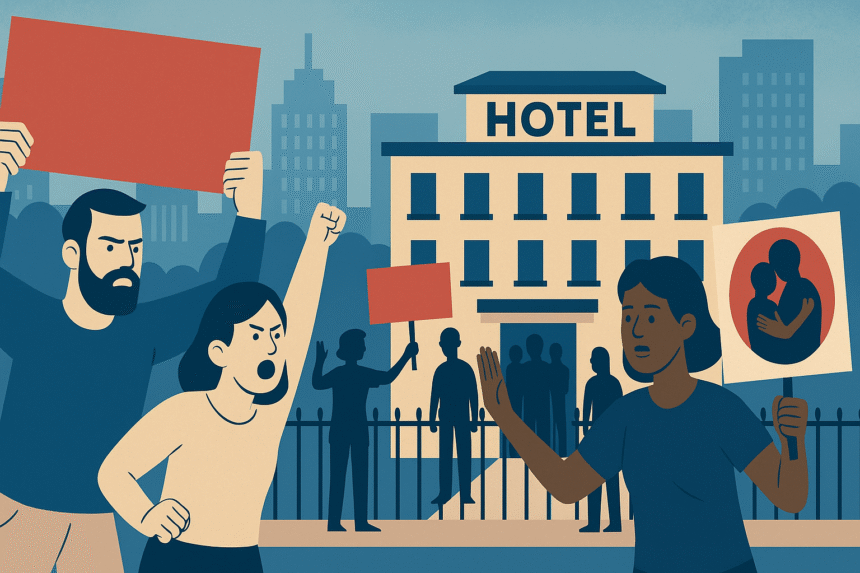The UK government’s policy of housing asylum seekers in hotels has triggered a new wave of protests, now spreading from traditionally working-class and deprived areas into some of London’s most prestigious and affluent neighborhoods, including Canary Wharf and Islington. Residents in these areas have expressed growing concerns over public safety, housing values, and the long-term use of hotels as temporary accommodation amid a continued backlog in immigration processing.
From Crisis Response to Long-Term Controversy
The use of hotels to house asylum seekers began as a pandemic-era response under the previous Conservative government, aimed at managing a mounting number of asylum claims. Originally intended for short-term stays, prolonged processing times and the continued influx of new arrivals have transformed these hotels into semi-permanent residences, with some asylum seekers staying for months or even years.
Now, under the Labour government, the Home Office faces mounting pressure to phase out the use of hotels entirely. Recent efforts to reduce hotel reliance come alongside crackdowns on illegal work by asylum seekers, particularly those working as delivery drivers without legal authorization.
Canary Wharf Residents Mobilize
In Canary Wharf, a traditionally business-focused area known for its high-rise residences and international demographic, local residents have begun organizing against the decision to house asylum seekers at the Britannia International Hotel. Maxi Gorynski, an IT professional and co-organizer of a residents’ opposition group, voiced concerns ranging from petty crimes to serious offenses — fears he attributes to a lack of public consultation and clarity from the government.
Gorynski emphasized that protests in the area are not affiliated with far-right groups, noting the diverse racial and political backgrounds of participating residents. However, the movement has been galvanized online by prominent populist and right-wing figures such as Nigel Farage, Tommy Robinson, and UK Independence Party leader Nick Tenconi.
Islington and Epping: Flashpoints of Controversy
Similar protests have taken place in Islington, where the Thistle City Barbican Hotel has become the focus of demonstrations related to antisocial behavior and child safety. Some residents, like a local mother of seven who declined to give her full name, have expressed discomfort over what they perceive as an increase in disruptive behavior linked to the hotel. Metropolitan Police data, however, shows that the hotel’s surrounding area ranks ninth lowest in crime among the borough’s 17 wards.
In Essex, protests at the Bell Hotel in Epping intensified after a male asylum seeker was charged — and denies — assaulting a 14-year-old girl. Conservative Essex Police Commissioner Roger Hirst called for the immediate closure of the hotel, arguing that the presence of 145 young men unfamiliar with local norms had strained local resources.
Economic and Social Pressures
The presence of asylum seeker hotels in high-value property areas has sparked concern among homeowners and real estate agents. John Costea, an estate agent near the Britannia, reported that both UK-based and international buyers have expressed hesitation, asking how such developments might impact property values.
In Islington and other parts of the southeast, local Facebook groups have been used to organize protests — sometimes posting photos of asylum seekers and reposting links from far-right sources. In response, Labour councillors and anti-racist groups have staged counter-protests, emphasizing solidarity with asylum seekers and rejecting xenophobic rhetoric.
Zoe Manzi, an analyst at the Institute for Strategic Dialogue, noted that since the riots of last year, anti-asylum rhetoric has moved from extremist margins into more mainstream political discourse. She cited growing frustration over rising petty crime and public disorder — concerns that have been seized upon by populist politicians to push narratives such as Farage’s “Lawless Britain” campaign.
A Divisive National Issue
The asylum hotel policy has become a lightning rod for broader debates over immigration, public safety, and social cohesion. The Labour government continues to face a delicate balancing act: reforming a strained asylum system while managing local anxieties and minimizing the influence of far-right groups seeking to exploit the issue.
While the Home Office maintains that hotel use is being phased out as part of an asylum system overhaul, many residents — both in affluent postcodes and beyond — argue that change isn’t coming fast enough.
As Gorynski summed up, “We just can’t possibly understand how any of this could be in our interest.” For him and others, the issue is less about ideology and more about transparency, planning, and public confidence in government decisions.








